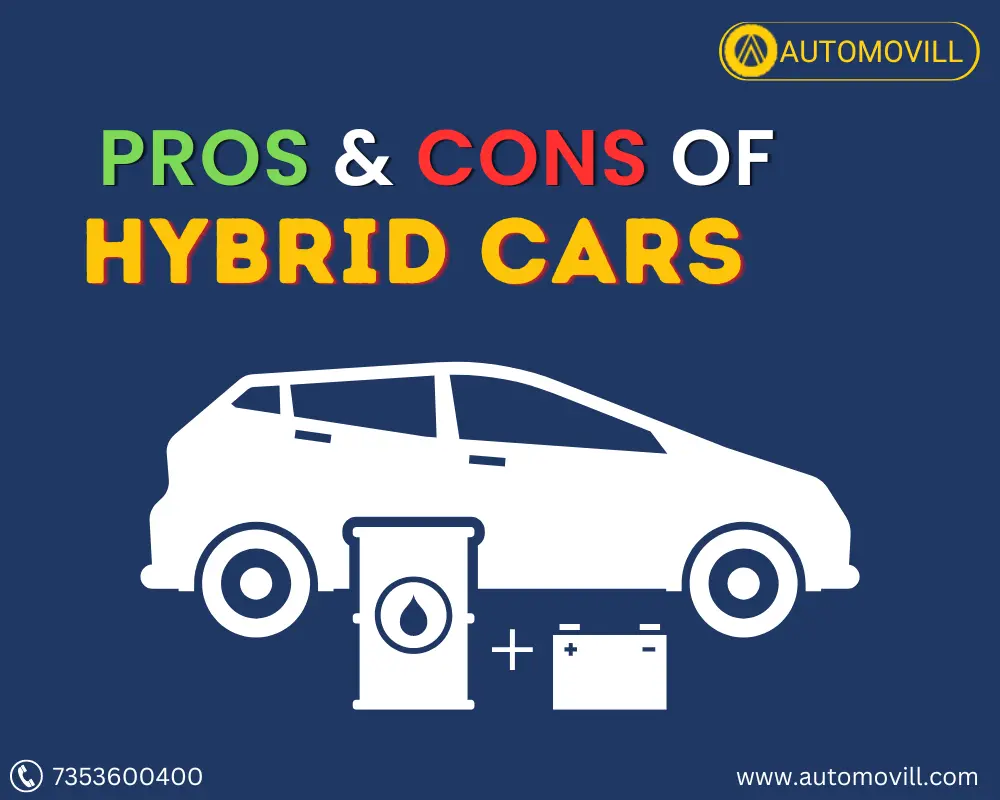In recent years, hybrid vehicles have gained enormous popularity in India due to greater fuel economy, lower emissions, and a lack of infrastructure for electric vehicles. These days, some manufacturers have seized the chance to use hybrid technology in mass-market vehicles.
These vehicles combine the advantages of an internal combustion engine and an electric motor to provide power. There are some disadvantages to take into account, though. Let’s examine the benefits and drawbacks of hybrid vehicles.
Pros
- Fuel Efficiency: Hybrid cars are known for their fuel efficiency. Because they use both petrol and electric power to run, hybrid cars can achieve much higher miles per gallon (MPG) than traditional petrol-powered cars. This means less time and money spent at the gas pump, which is great for your wallet and the environment.
- Environmentally Friendly: Hybrid cars emit less pollution than traditional petrol-powered cars. The electric motor in a hybrid car produces no emissions, which means less pollution in the air we breathe. Hybrid cars also produce less carbon dioxide (CO2), a greenhouse gas that contributes to climate change.
- Tax Incentives: Depending on where you live, there may be tax incentives for driving a hybrid car. These incentives can include tax credits, rebates, or reduced registration fees. These incentives can help offset the higher initial cost of buying a hybrid car.
- Regenerative Braking: Hybrid cars use a technology called regenerative braking, which captures the energy generated by the brakes and uses it to recharge the car’s battery. This means that the battery is constantly being recharged while you drive, which can extend the life of the battery and reduce the amount of petrol needed to power the car.
- Smooth and Quiet Driving: Because hybrid cars use an electric motor at low speeds, they can offer a smooth and quiet driving experience. This can be particularly enjoyable in city driving conditions where stop-and-go traffic is common.
Cons:
- Higher Initial Cost: Hybrid cars typically cost more than traditional petrol-powered cars. While tax incentives can help offset the cost, the higher upfront cost can be a barrier to entry for some consumers.
- Limited Driving Range: Hybrid cars rely on both petrol and electric power to run, which means they have a limited driving range. If the battery runs out of charge, the petrol engine will need to take over. This can limit the distance you can travel on a single tank of gas.
- Battery Replacement: Hybrid car batteries can be expensive to replace. While the regenerative braking technology can help extend the life of the battery, eventually, it will need to be replaced. Depending on the make and model of the car, the cost of a new battery can be several thousand dollars.
- Less Power: Hybrid cars typically have less horsepower than traditional petrol-powered cars. This can be a drawback for drivers who want a car that can accelerate quickly or handle high speeds.
- Maintenance and Repairs: Hybrid cars require specialized maintenance and repairs. Not all mechanics are trained to work on hybrid cars, which means finding a qualified mechanic can be more difficult and potentially more expensive.
In conclusion, while hybrid cars offer numerous benefits, including fuel efficiency, environmental friendliness, tax incentives, and regenerative braking, they also have some drawbacks, including a higher initial cost, limited driving range, expensive battery replacement, less power, and specialized maintenance and repairs.
Whether a hybrid car is right for you depends on your individual needs and preferences. If you prioritize fuel efficiency and environmental friendliness and are willing to pay a higher initial cost, a hybrid car may be a good choice for you. However, if you prioritize power and speed or have concerns about the cost of battery replacement and specialized maintenance, a traditional petrol-powered car may be a better fit.
